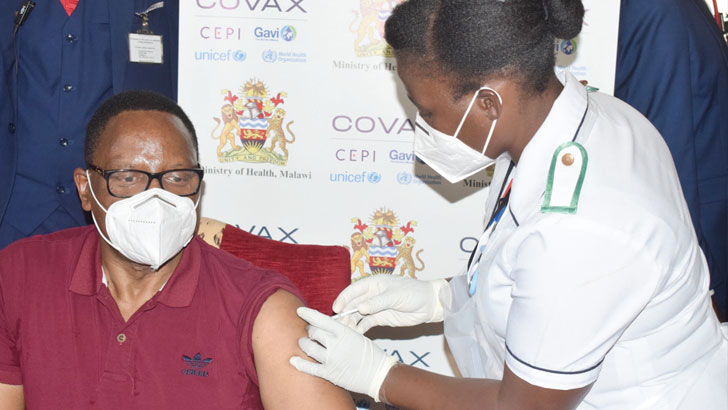From Delta to Omicron: When Covid-19 hit hard
Since the start of the year 2021, the Covid-19 pandemic has dominated public discourse.
For Malawi, like many countries in the world, the year started on a bad note as the third wave of Covid-19 virus spread like wildfire ravaging jobs, economies and lives.

Despite numerous measures by the government to avert the further spread of the novel virus, the burden was just too heavy and death did not spare anybody regardless of their status in society.
Covid-19 deaths dealt many a blow. From ordinary Malawians to the most prominent and influential people in society such as politicians, academicians, healthcare workers, religious leaders and musicians, Covid-19 spared no body.
The citizenry was aghast on January 12 this year when two serving Cabinet ministers succumbed to Covid-19 on the day. These were Mohammed Sidik Mia, who was minister of Transport and Public Works and vice-president of Malawi Congress Party and Lingson Belekanyama, who was Minister of Local Government. And the number of deaths climbed everyday.

In January alone, Malawi registered 351 of the 540 coronavirus-related deaths compared to 189 deaths recorded during the first wave between April and December 2020.
Covid-19 fight
President Lazarus Chakwera had to act fast. On January 17 2021 he unveiled a multi-billion kwacha strategy to fight the pandemic.
The President’s plan included introduction of night curfews and construction of temporary hospitals in Blantyre, Lilongwe, Mzuzu and Zomba to treat Covid-19 patients.
According to Chakwera, K17.5 billion would be spent across various public sector clusters, which were part of a Covid-19 response with Treasury injecting K100 million into Christian Health Association of Malawi run hospitals to support payment of health workers.
No vaccine in sight
As the number of people dying from Covid-19 around the globe grew, scientists raced against time to find a vaccine. In more advanced economies such the United States and Europe, vaccination campaigns were at full throttle.
But as World Health Organisation (WHO) director-general Tedros Adhanom Ghebreyesus revealed in January, only 25 doses of the Covid-19 vaccine had been administered in Africa.
It was only by mid February, that Covid-19 vaccines were becoming readily available to poorer nations such as Malawi.
In March, the country received the first batch of AstraZeneca/Oxford vaccines courtesy of the Covax Facility a global initiative intended to secure equitable vaccines for poorer nations.
Chakwera and Vice-President Saulos Chilima led the vaccine inoculation rollout on March 11 2021 with a clarion call for Malawians to ignore misconceptions spread about the vaccines.
“Let us hold hands and take care of the life that God has given us in order to serve Him as He wants us to.
“The vaccine is not about the 666 mark of the beast in the Book of Revelation, no. It is about saving lives and serving God with that life while we are healthy,” said Chakwera.
Since then, several other batches including the Johnson and Johnson (J and J) have been received in the country through the same Covax Facility.
Covid-19 funds abuse
While the leadership and donor partners mobilised funds to fight Covid-19, an investigative audit into some of the Covid-19 Response Funds government had released revealed that about K6.2 billion had been abused.
The revelation was a huge setback in the fight against the pandemic. A public outcry over alleged mismanagement of the Covid-19 response funds forced Chakwera to dismiss then minister of Labour Ken Kandodo and suspend other top government officials including all district commissioners for being implicated in the audit report.
Low vaccine uptake
As reported cases started to dwindle signalling an end to the third wave of the pandemic, on May 19 2021 the country was forced to burn 19 610 doses of the AstraZeneca/Oxford vaccines following their expiry amid a low uptake.
Infectious disease expert and epidemiologist Dr Titus Divala told The Nation edition of May 19 2021 that lack of public information on the vaccination programme was contributing to the decline in vaccine uptake; hence, subsequently leading to expiry of the vaccines.
Said Divala: “The vaccine clearly prevents severe disease and death and we have before us the opportunity to save lives but at the moment, this message is very faint in favour of the headline capturing yet extremely rare side effects.”
As a result of the vaccines expiring, the Ministry of Health suspended the vaccination exercise until another batch of the vaccines arrived in the coming month. At this point, the reported cases of Covid-19 were on a low.
Due to low vaccine uptake, Malawi missed its target to vaccinate 10 percent of the targeted population in September, as set by the WHO.
The country is targeting to immunise 11 million people, representing 60 percent of the critical population by December 2022.
But as of December 2021, statistics show that only 3.2 percent of the targeted population has been vaccinated with health rights activists casting doubts if the country will be able to reach the set 60 percent target by December 2022.
Enter Omicron
As Malawi grappled with getting its citizens vaccinated to guard against the Delta variant and other variants of concerns, a new super spreader Omicron variant was recorded in November 2021.
South African scientists discovered the Omicron variant otherwise known as the B.1.1.529 in one of the travellers to the rainbow nation.
In a Covid-19 update of December 5 2021, Minister of Health Khumbize Chiponda confirmed the fourth wave and urged the citizenry to observe all preventive measures, including getting vaccinated.
A comparative analysis showed that cases of Covid-19 between December 2020 and December 2021 the country was recording more cases this year as well as deaths compared to last year.
Health experts feared the Omicron variant is spreading fast than imagined.
The year 2021 has been a rollercoaster in as far as Covid-19 is concerned globally.
However, vaccination gives hope of beating the virus.





